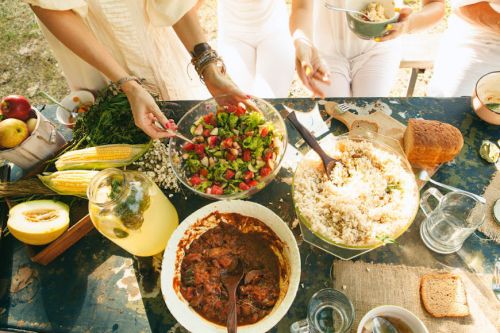If you have irritable bowel syndrome, navigating mealtime can feel like tip-toeing through a digestive minefield. This can cause many people to keep the same few foods on rotation or be too anxious to eat much of anything at all. In both cases, it pretty much sucks.
Not only can limiting what you put on your plate lead to a less-than joyous meal, it also gets in the way of getting the nutrients you actually need—especially on the fiber front. High-fiber diets are linked to improving gut health, so not getting enough likely isn’t doing someone with gut issues any favors. (Plus, fiber is associated with lower cholesterol levels, improved metabolism, and longevity.)
Of course if you have IBS, it might seem counter-intuitive to eat more of a nutrient that’s known for helping you poop. It certainly isn’t a great idea to go ham on all the fiber sources out there. It’s important to work with a gastroenterologist to heal your gut, and a nutritionist or dietitian can help you craft meal plans that won’t upset your stomach. Still, there are some general rules registered dietitian Sharon Palmer, RD says are helpful to keep in mind when looking to improve your fiber intake.
1. Fill your plate with low-FODMAP veggies
All vegetables have fiber, but Palmer points out that not all veggies are friends to people with IBS. “There can be some vegetables that may be triggers,” she says. The most common, Palmer says, are high-FODMAP vegetables such as cauliflower, mushrooms, and Brussels sprouts. These FODMAP foods contain groups of short-chain carbohydrates that can cause gastric distress for people with IBS. “This is because they contain sugars and fibers that are rapidly fermented in our guts,” Palmer says. Many people with IBS have found that avoiding high-FODMAP foods can help minimize their symptoms, though it should be noted that it’s meant to be a temporary diet, not a life-long eating plan.
This is hardly to say that all veggies are off the table—there are still many low-FODMAP foods that offer up some fiber, including spinach, arugula, squash, and tomatoes. Experiment with low-FODMAP, fiber-rich veggies in new ways to avoid food fatigue. Even prepping them in a different way—such as roasting your tomatoes instead of eating them raw—can add excitement to your meal.
2. Mix your veggies with lower FODMAP grains instead of lentils
“Pulses, such as beans can be a trigger in some people with IBS,” Palmer says. A safer pairing for your veggies, she says, are lower FODMAP pulses like lentils and whole grains, such as buckwheat, oats, millet, quinoa, and rice. Use one of these options to round out your veggies and protein for a complete meal.
Speaking of grains, what’s the deal with gluten? An RD sounds off:
3. Get your fiber throughout the day instead of all at once
On average, a good fiber goal to set is 25 grams a day, but getting it all at once can cause lots of digestive distress—especially if that’s something you’re already susceptible to. A better way to go is spreading out your intake throughout the day, so you don’t overload your stomach.
“The amount of fiber you tolerate can be a unique, depending on your own symptoms, triggers, and physical state,” Palmer says. If you’re not used to getting much fiber in your diet, start small and increase the amount per meal slowly.
4. Go slow when experimenting with new fiber sources
High-fiber products are super trendy right now, which can provide convenient ways to meet your fiber goals. While it’s great fiber has gone mainstream, Palmer reiterates her advice of going slow when incorporating these products into your diet. “One common trigger [of IBS] is inulin, a common source of added fibers in foods,” she says, adding that chicory root is a common source of inulin often found in high-fiber products.
However, if you give it a try and it seems to agree with your body, Palmer says go for it. “Inulin is a healthful prebiotic, so if it’s not a trigger for you, you don’t have to remove it completely,” she says. In general, it’s good to be aware of what the fiber sources in these products are so you can keep track of what’s easy for you to digest, and what isn’t. (Yet another reason why it’s always a good idea to read nutritional labels!)
Fiber is important—for everyone. While IBS may mean limiting some sources from your diet, it absolutely doesn’t mean nixing them all. Keep these guidelines in mind and not only is getting enough fiber possible, it will taste pretty good, too.
Here’s the verdict on if exercise can actually help with IBS symptoms. Plus, myths about the low-FODMAP diet doctors want you to know.
Sign Up for Our Daily Newsletter
Get all the latest in wellness, trends, food, fitness, beauty, and more delivered right to your inbox.
Got it, you've been added to our email list.










